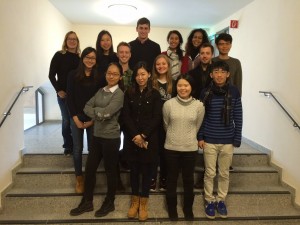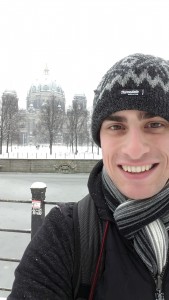Pre-departure:
I would recommend that students participating in a winter/summer school programme start applying for their visas as soon as possible. This is especially relevant in cases where you hope to spend some time there before the programme commences (e.g. travelling around your destination). The other big must is to have your documentation correct down to the tee.
The German Embassy was extremely strict about their requirements and appointments become more difficult to obtain as you approach the peak season for holiday travellers. The International Office team were extremely helpful during the whole process and it was a breeze obtaining all the required documentation for visa purposes. They were also always at the ready to answer any questions that may arise during the process, so make use of this valuable resource!
Another big preparatory tip is getting the correct adapter for the wall socket. Once you leave the country it is nearly impossible to find SA-overseas adapters in any of the local stores; you definitely do not want to get stuck without a functioning laptop. I would also recommend that if they do not have Wi-Fi or an internet connection available at the accommodation provided, you try to make contact with someone who has purchased a simcard, as I erroneously bought a “tourist” sim which essentially meant that I had 20 Euros airtime which could not be converted into data (which may be problematic if you need to do some research at your flat). You may end up paying double to correct this.
Finally, I would say that if you are going to a non-English speaking country, it is imperative that you have some basic phrases handy to get you to a train-station or to your accommodation. The locals are often much more receptive when you try to engage with them in their language, and will often be more than happy to assist you in English. The Germans are not a characteristically warm people, but a simple “Guten Tag” and “Tschüss” has gotten me out of some pretty awkward situations.
Experience at the host university:

I participated in the German Language course called “Berlin Im Winter” at Humboldt. I am extremely passionate about modern foreign languages, and for me there was no better way to learn than to immerse myself into the culture and the local way of life. There was no lack of this in the Berlin Im Winter programme. The academic programme was focused on your competency level, and ranges from absolute beginner (A0) to intermediate and advanced levels (B2-C1). I started in the absolute beginner group as I had no prior experience with German, but found that my Afrikaans background enabled me to advance quite rapidly in the course.
Even though I had the opportunity to later move up, I thoroughly enjoyed the interactive elements of the beginners’ course which forced me to overcome my shyness and engage orally. This was in stark contrast to the more advanced courses where the focus was very much on grammar and formal writing rather than pronunciation. To me, it was surreal to experience the transition from understanding about 5% of what is written on street signs or billboards to being able to decipher nearly every phrase that meets the eye. In essence, I suddenly felt at home so many thousands of miles from it. But beyond the academic programme, the cultural programme offered us the most amazing Berlin experiences including fascinating museum visits, ice skating expeditions and opportunities to travel to explore nearby towns.
Oh, and the people you meet. Never in my life had I experienced so many cultures in one place, and the fact that it wasn’t a home country for any of us, was a catalyst for some interesting conversations and exchanges regarding the differences between our respective home nations. It is a great opportunity to make friends that you can one day visit or who can visit you back home.
Personally, I was able to enjoy much more of the student experience than I usually do in Stellenbosch (due to the demands of my course) and so it was refreshing to transcend the academic sphere and explore other passions that are often neglected.
The programme suited my needs perfectly and in hindsight I would not have opted for anything else, Ich bin so zufrieden!
Return to Stellenbosch:

Most notably, the heat was a massive adjustment. Coming from -10 degrees to almost 40 was a shock that I was completely unprepared for. But for my first snow experience it was totally worth it! When I got back to Stellenbosch, I realized that although we are so far away (in terms of distance on a map), we as students face many similar issues and that the “grass is greener” idea is often fallible when you begin to recognize the issues that plague other countries as well as your own. I did however notice some stark differences (and not only the fact that the Rand was weak). Students from Europe, Australia and the United States were on average much more liberal and outspoken than South Africans. Many topical issues such as cannabis usage and public alcohol consumption were considered to be much less taboo than back home. In addition, I found that European students were generally well-travelled (at least within Europe) and were very conscious of their traditions, especially during the festive season.
I feel that I have been morphed by this experience, suddenly looking at the world as open to a multitude of interpretations. I also found that the cultural experiences truly enhanced my understanding of what has come to shape the modern world we live in, and how we each have a very important role to play in addressing the issues that face our societies. Furthermore, this trip has inspired me to pursue a Master’s degree in Germany (hopefully) as I fell in love with the people, the culture, the language and let’s not forget the food.
